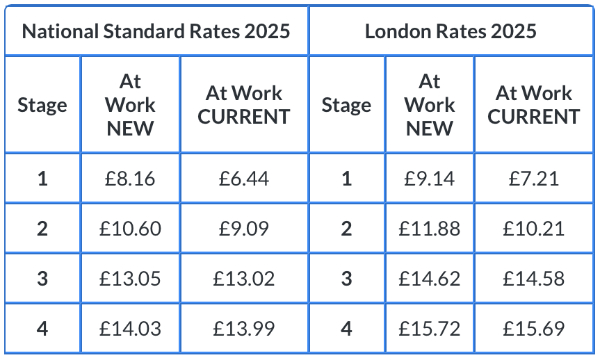New apprentice pay rates coming into effect in the new year
Contents |
[edit] Addressing the impact of national minimum wage on apprentice rates
To address the impact of recent national minimum wage changes on apprentice rates of pay, ECA, SELECT and Unite the Union have collaborated to implement new apprentice rates of pay, coming into effect from 6 January 2025.
This measure aims to ensure fairness and stability for apprentices throughout their apprenticeships and ECA, SELECT, and Unite the Union have collaborated to implement this solution.
The electrical industry is facing a pressing need for skilled workers to support the low carbon transition, with an estimated requirement for 15,000 newly qualified electricians over the next five years. To meet this demand, the recruitment of at least 12,000 electrical apprentices annually is crucial, significantly higher than the current average of 8,000 per year. Ensuring fair pay is a critical element in attracting and retaining this talent pipeline.
The agreed updated rates of pay for 2025 are as follows:
[edit] JIB Table of Rates and Differentials
Part of this updated agreement is to remove the ‘At College’ rate of pay for England, Wales and Northern Ireland. This means there is one rate of pay which applies to all hours of work or as part of off the job learning during an apprenticeship. For clarity, this does not affect those apprentices employed in Scotland under the SJIB National Working Rules for whom the ‘At College’ rate remains for Stage 3 and 4.
[edit] National Standard Rates 2025
The agreement between ECA, SELECT, and Unite takes effect from Monday 6th January 2025 and retains the benefits of grading by encouraging apprenticeship completion and progression to electrician status, and the obtainment of a gold card in a structured way.
This is set against the backdrop of upcoming pay negotiations for 2026 onwards, which will commence in in 2025.
The updated JIB Handbook which contains all updated rates for 2025 is being finalised and will be shared here soon.
For a copy of the SJIB rates of pay for 2025, please see here.
This article appears on the ECA news and blog site as 'New apprentice pay rates to come into effect January 2025' dated 20 December 2024.
--ECA
[edit] Related articles on Designing Buildings
- Apprenticeships.
- Call for support in green electrical apprentice shortfall.
- Coronation recognised eco apprenticeships continue help grow green workforce.
- ECA.
- ECA 2024 Apprentice of the Year Award.
- ECA calls on London Mayor to prioritise green electrical skills in the capital.
- ECA launches new Apprenticeship resources
- New electrical apprentice rates.
- The ECA Recharging Electrical Skills Charter included in key report.
- The general election and why a shortage of electrical apprentices matters.
- A-Level results and electrical apprenticeships
.
Featured articles and news
Scottish parents prioritise construction and apprenticeships
CIOB data released for Scottish Apprenticeship Week shows construction as top potential career path.
From a Green to a White Paper and the proposal of a General Safety Requirement for construction products.
Creativity, conservation and craft at Barley Studio. Book review.
The challenge as PFI agreements come to an end
How construction deals with inherited assets built under long-term contracts.
Skills plan for engineering and building services
Comprehensive industry report highlights persistent skills challenges across the sector.
Choosing the right design team for a D&B Contract
An architect explains the nature and needs of working within this common procurement route.
Statement from the Interim Chief Construction Advisor
Thouria Istephan; Architect and inquiry panel member outlines ongoing work, priorities and next steps.
The 2025 draft NPPF in brief with indicative responses
Local verses National and suitable verses sustainable: Consultation open for just over one week.
Increased vigilance on VAT Domestic Reverse Charge
HMRC bearing down with increasing force on construction consultant says.
Call for greater recognition of professional standards
Chartered bodies representing more than 1.5 million individuals have written to the UK Government.
Cutting carbon, cost and risk in estate management
Lessons from Cardiff Met’s “Halve the Half” initiative.
Inspiring the next generation to fulfil an electrified future
Technical Manager at ECA on the importance of engagement between industry and education.
Repairing historic stone and slate roofs
The need for a code of practice and technical advice note.
Environmental compliance; a checklist for 2026
Legislative changes, policy shifts, phased rollouts, and compliance updates to be aware of.























